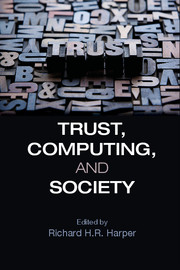Book contents
- Frontmatter
- Contents
- Author Biographies
- Acknowledgments
- Dialogues Trust, Computing, and Society: Introduction
- Part 1 The Topography of Trust and Computing
- Part 2 Conceptual Points of View
- 5 Computing and the Search for Trust
- 6 The Worry about Trust
- 7 The Inescapability of Trust: Complex Interactive Systems and Normal Appearances
- 8 Trust in Interpersonal Interaction and Cloud Computing
- 9 Trust, Social Identity, and Computation
- Part 3 Trust in Design
- References
- Index
8 - Trust in Interpersonal Interaction and Cloud Computing
from Part 2 - Conceptual Points of View
Published online by Cambridge University Press: 05 March 2014
- Frontmatter
- Contents
- Author Biographies
- Acknowledgments
- Dialogues Trust, Computing, and Society: Introduction
- Part 1 The Topography of Trust and Computing
- Part 2 Conceptual Points of View
- 5 Computing and the Search for Trust
- 6 The Worry about Trust
- 7 The Inescapability of Trust: Complex Interactive Systems and Normal Appearances
- 8 Trust in Interpersonal Interaction and Cloud Computing
- 9 Trust, Social Identity, and Computation
- Part 3 Trust in Design
- References
- Index
Summary
Trust and Formal Analysis
I came to the consideration of trust not because it is currently a public issue, nor because it seems to be in vogue in sociology. Instead, I was dismayed at some of the recent sociological treatments of the subject and, in particular, at these studies’ cursory treatment of one of what many would consider to be the leading foundational modern study of trust in social interaction, that of the late Harold Garfinkel who, in 1963, published a paper titled “A Conception of, and Experiments with, ‘Trust’ as a Condition of Stable, Concerted Actions,” (Garfinkel 1963b).
During the time that he was Professor of Sociology at the University of California at Los Angeles, Garfinkel devised a radically innovative approach that he termed “ethnomethodology.” This meant “members’ methods.” By this, then, Garfinkel intended not a technical or professional research method per se but, instead, a topic for study; namely the study of society members’ interactionally deployed cultural methods of making sense of the everyday contexts in which they find themselves, methods also of sharing this sense and incorporating it into their joint projects of action – in a phrase, sense-making-in-action.
- Type
- Chapter
- Information
- Trust, Computing, and Society , pp. 172 - 198Publisher: Cambridge University PressPrint publication year: 2014
- 4
- Cited by



